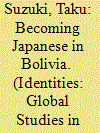|
|
|
Sort Order |
|
|
|
Items / Page
|
|
|
|
|
|
|
| Srl | Item |
| 1 |
ID:
073443


|
|
|
|
|
| Publication |
2006.
|
| Summary/Abstract |
This article chronicles the changing subject-positions of Okinawans in Bolivia from the 1950s to 1990s, who migrated to Colonia Okinawa, an agricultural settlement in the eastern Santa Cruz region, as sponsored migrants backed by the United States military administration and the Okinawan (Ry?ky?) government. Since the forced annexation of Okinawa by Imperial Japan in 1879, Okinawans and the Okinawan Diaspora have often been discriminated against by the Japanese government and the immigrants from mainland Japan as illegitimate Japanese national subjects. The lack of active intervention by the Japanese government and the virtual absence of Japanese mainlanders in the settlement, however, enabled the Okinawan settlers to maintain their Okinawan cultural identities and practices without being questioned about their legitimacy as Japanese. Underscored by their socioeconomic success as large-scale farm owners who employed the locals as inexpensive laborers, the settlers gradually shifted their primary identification from "Okinawan" to "Japanese" in the particular social contexts of Colonia Okinawa. The settlers' concern about their children's cultural assimilation into the local Bolivian population led them to stress the Japanese-Bolivian polarity, while relegating the troubled history between Japan and Okinawa into the background. As a result, Okinawans in Colonia Okinawa, despite their status as formerly colonized subjects under Imperial Japan, "became" Japanese-vis-à-vis local Bolivians-without culturally becoming as one.
|
|
|
|
|
|
|
|
|
|
|
|
|
|
|
|
| 2 |
ID:
187161


|
|
|
|
|
| Summary/Abstract |
This paper discusses the political legacies of transmigration in local elections in Indonesia. Lampung province has an unusual ethnic make-up because in the past 100 years both the Dutch colonial administration and Indonesian Government have been implementing a transmigration programme. Transmigration has therefore changed the demographic pattern of Lampung. Since 2005, the mode of local election has been changed from indirect to direct. As a consequence of this, there is a revival of ethnic identity politics in local elections. In this paper, we focus on a transmigration affected area where the descendants of Javanese transmigrants are numerically dominant and correspondingly powerful in local politics. This research leads us to argue that ethnicity has become an important factor in local elections and that in transmigration affected areas it has led to the political domination of Javanese transmigrant descendants in local politics. We further to show how, in response to this, native Lampungese elites have adopted a number of strategies to help them retain a role in local politics. Our argument runs contrary to that of some scholars who have claimed that ethnicity is playing a diminishing role in Indonesian local elections.
|
|
|
|
|
|
|
|
|
|
|
|
|
|
|
|
| 3 |
ID:
101759


|
|
|
|
|
| Publication |
2010.
|
| Summary/Abstract |
Several of the arguments made in this article rarely appear in the existing literature of indigenousness. First, that the nature of indigenousness may not be stable. This article examines the formation and reformation process of Taiwanese indigenousness with a focus on the latter. Second, the driving force of indigenousness might be economic. This article argues that the driving force of the formation process of Taiwanese indigenousness is more political than cultural, whereas that of the reformation process is more economic than political. Third, the key element of indigenousness is "attachment to the land," not "aboriginal people." In the formation process of Taiwanese indigenousness, physically residing in Taiwan was deemed important to show attachment to Taiwan. However, transmigration process influences the reformation process of the Taiwanese indigenousness so that one can show attachment through actions overseas. Fourth, in a transnational social field, new strategies to keep or reform indigenousness might be developed. This article introduces two strategies the Taiwanese government has used to ensure that Taiwanese people in China keep their attachments to Taiwan. In this article, these two strategies are named graduated sovereignty and governance of spatial movements.
|
|
|
|
|
|
|
|
|
|
|
|
|
|
|
|
|
|
|
|
|